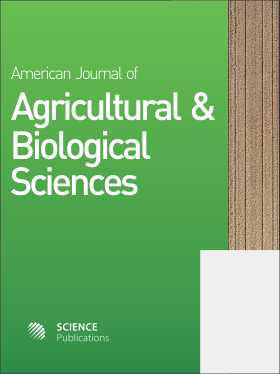Salicylic Acid Protects Nitrate Reductase Activity, Growth and Proline in Amaranth and Tomato Plants during Water Deficit
- 1 Department of Botany and Microbiology, Faculty of Science, University of Lagos, Private Mail Bag 1029 Unilag Post Office, Akoka-Yaba, Lagos, Nigeria
Abstract
Problem statement: Seedlings of Amaranthus hybridus cv. NHAC-3 (large green, amaranth) and Lycopersicum esculentum cv. Roma (tomato) were subjected to 7 days water stress at Early Vegetative (EV), Late Vegetative (LV), Early Flowering (EF) and Late Flowering (LF) stages of growth to study the impact on leaf water potential (ψw), Nitrate Reductase Activity (NRA), growth (plant height, shoot and root biomass) and proline content of both plants. Approach: Two concentrations of salicylic acid (1 and 3 mM SA) were applied to stressed plants to study the level of protection given by SA to the plants. Leaf ψw was significantly reduced (p = 0.05) during stress treatment at nearly all stages of growth in both plants. Leaf ψw was in the range -0.25 to -1.42 (unstressed) and -1.45 to -2.02 (stressed) in tomato plants while in amaranth it was -0.7 to -1.62 (unstressed) and -1.62 to -2.68 (stressed). As 3 mM SA increased leaf ψw to values close to the control (unstressed plants). NRA was significantly (p = 0.05) reduced by stress treatment at the LV stage of amaranth, EF stage of tomato and LF stage of both plants. Results: Thus, the reduction of NRA was more pronounced at the reproductive stage of both plants. As 3 mM SA was effective in maintaining NRA at levels similar to the control in both plants. Stress treatment reduced plant height significantly (p = 0.05) at the vegetative stages of both plants and 3 mM was also effective in keeping plant height similar to the control. Though shoot biomass was affected by water stress, SA treatment was not very effective in preserving the biomass during stress. Root biomass of plants was reduced by stress treatment at the reproductive stage and only tomato plants responded positively to 3 mM SA. Proline content was only slightly increased at all stages of growth in stressed plants but 3 mM SA induced a two-fold increase in proline content at the vegetative stage of tomato (EV and LV) and significant increases (p = 0.05) at almost all stages of growth of amaranth. Conclusion/Recommendations: The build up of proline, an osmolyte, by SA in stressed plants increased the capacity of plants to absorb water from the soil as shown by the increase in leaf ψw of both plants from -1.45 to -0.25 . SA was more effective in protecting the plants against the adverse effects of water stress when the stress was given at the vegetative stages (EV and LV) than at the flowering stages (EF and LF).
DOI: https://doi.org/10.3844/ajabssp.2009.224.229

- 7,936 Views
- 7,008 Downloads
- 41 Citations
Download
Keywords
- Amaranth
- tomato
- water potential
- growth
- salicylic acid
- proline
